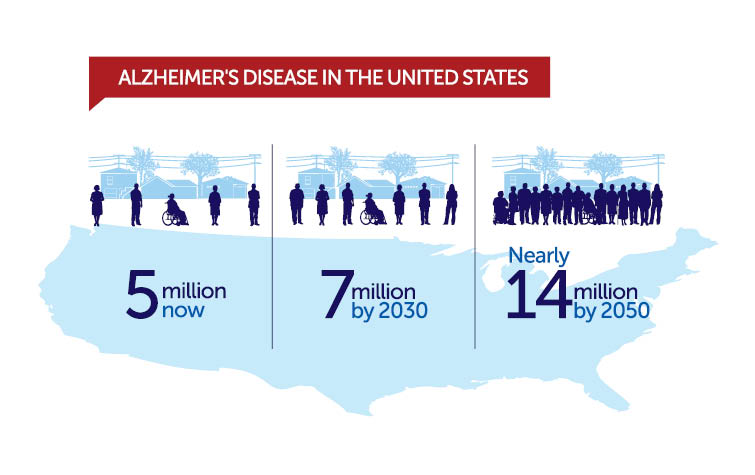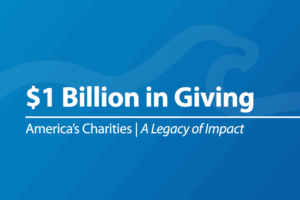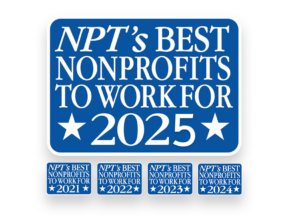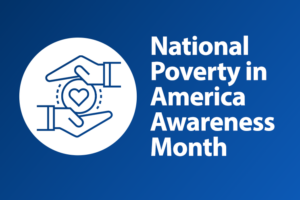Sarah Ford | November 5, 2015
The National Cost of Alzheimer’s is Projected to Reach $1.2 Trillion by 2050, But We Can Change This.
Join America’s Charities, now through December, as we highlight different nonprofits and share how individuals and companies can Shape the Future of various causes through workplace giving programs.
Alzheimer’s disease is the sixth leading cause of death in the United States, yet it is the only cause of death among the top 10 in America without a way to prevent, cure, or even slow its progression. It is an irreversible degeneration of the brain that causes disruptions in memory, cognition, personality, and other functions and inevitably leads to death. More than 5 million Americans aged 65 and older are thought to have Alzheimer’s disease. This number is set to grow dramatically, as baby boomers are turning 65 at a rate of 10,000 people per day. By 2025 that number will likely be 7 million, and it will rise to nearly 14 million people living with Alzheimer’s by 2050.
The disease ravages not only the physical and emotional health of the patient, but it can have a devastating toll on families and caregivers. The very nature of the disease, with behavioral changes and forgetfulness as primary symptoms, places increasing burdens on caregivers, who often must provide around-the-clock care for many years. Unpaid caregivers frequently experience high levels of emotional stress and depression, and commonly report a negative impact on their own health, employment, income, and financial security.
The economic cost to society as a whole can be just as devastating, as total payments for health care, long-term care, and hospice for people with Alzheimer’s and other dementias are projected to increase from an estimated $214 billion in 2014 to $1.2 trillion in 2050 (in current dollars). This dramatic rise includes a 500% increase in combined Medicare and Medicaid spending.
Alzheimer’s Disease Research, with discovery, early-stage research at its core, is critical to funding the innovative ideas of researchers at the beginning of their career who are gathering preliminary data that one day may be the focus of large federal funding. In other words, without major support of early-stage research, a breakthrough is almost impossible to occur.
“We are proud to support groundbreaking research. The scientists we fund are paving the way to a cure,” said Dr. Guy Eakin, Vice President of Scientific Affairs.
Through the efforts of researchers worldwide we have come to a better understanding of this devastating disease, and Alzheimer’s Disease Research is committed to funding groundbreaking scientific research that may lead to a cure that can impact millions of people.
We have invested more than $93 million in support of the most promising new ideas in the field of Alzheimer’s research. This is a huge success when our average individual donation is only $29. With every donation we receive, whatever the amount, we are able to continue the fight to find a cure for this devastating disease.
Our thanks to Alzheimer’s Disease Research for sharing their mission and impact with us. You can learn more about their work by visiting their website at www.brightfocus.org/alzheimers. To support their efforts, please donate to Alzheimer’s Disease Research through your company’s workplace giving program (CFC #30518 if you’re a Federal employee participating in the Combined Federal Campaign).
If your company would like to start a workplace giving program to support nonprofits like Alzheimer’s Disease Research, click here.

Get Resources and Insights Straight To Your Inbox
Explore More Articles
$1 Billion in Giving: America’s Charities Reaches a Historic Milestone
A testament to the impact of mobilizing the power of giving. We have some extraordinary news to share. In 2025, America’s Charities crossed a threshold that few organizations…
America’s Charities Named ‘Best Nonprofit To Work For’ For Fifth Consecutive Year
Washington, D.C. – April 1, 2025 – America’s Charities, the nonprofit that mobilizes the power of giving as a leading provider of volunteering, workplace giving,…
Get Resources and Insights Straight To Your Inbox
Receive our monthly/bi-monthly newsletter filled with information about causes, nonprofit impact, and topics important for corporate social responsibility and employee engagement professionals, including disaster response, workplace giving, matching gifts, employee assistance funds, volunteering, scholarship award program management, grantmaking, and other philanthropic initiatives.





